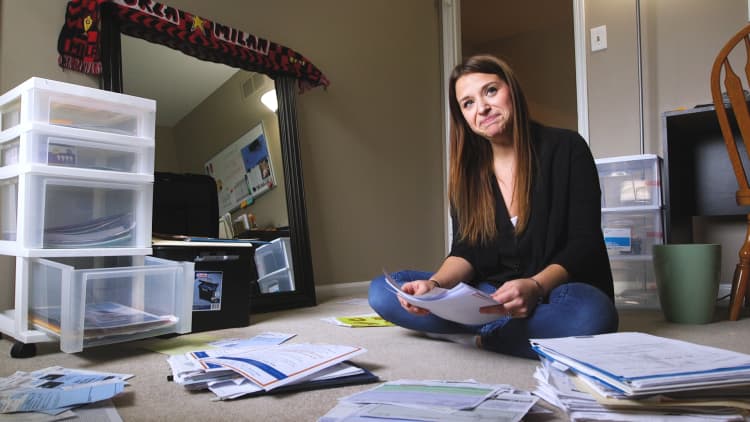
Cancer can take a significant toll on your health, your work, your family – and, increasingly, your wallet.
There are currently an estimated 16.9 million people in the U.S. who have received a cancer diagnosis. For them, the disease comes with many disproportionate hardships, from the physical and the emotional to the financial.
Not only is cancer one of the most expensive medical conditions to treat, but even those with good medical insurance face an added burden from other aspects of treatment, such as travel expenses and increased time off from work.
What is a problem is when the cost of care is a shock.Janet de Moorprogram director at the National Cancer Institute
Further, many people have high-deductible insurance plans, which means those patients have to pay out-of-pocket before their insurance even kicks in.
Already, a quarter of all cancer survivors have struggled to pay medical bills and about a third have worried about medical costs, according to a recent report from the Centers for Disease Control and Prevention.
In the long run, cancer survivors have much higher out-of-pocket expenses than those who have not had cancer, the CDC also found.
For cancer survivors, the average out-of-pocket spending each year was about $1,000, compared with $622 for people without a cancer history, the report said.

"The costs can be long lasting once patients finish the acute treatment," said Janet de Moor, a program director at the National Cancer Institute and one of the authors of the CDC report.
"Over time, your ability to absorb those expenses is going to go down," she added.
As more people are diagnosed with cancer, the financial burden will only worsen. A report from the National Cancer Institute found that, as the population ages, the number of people treated for cancer will grow even if cancer occurrence rates remain the same.
Costs are also likely to increase as new, more advanced and more expensive treatments are adopted.To manage the financial impact, having conversations about a prescribed course of treatment earlier on can help, de Moor said.
"That gives you the chance to plan proactively, whether that's identifying pharmaceutical discounts or financial assistance," she added. "What is a problem is when the cost of care is a shock."
More from Personal Finance:
How to prevent paying more for your health care than you should
This teacher wound up with a $108,951 medical bill
These 5 medical services will put a dent in your savings
Lawmakers have also introduced legislation to stop patients from getting hit with surprise medical bills, and the White House promised to make the issue a priority going forward.In addition, there are a number of different community organizations, including the American Cancer Society and CancerCare, that provide some direct assistance to patients.
The American Cancer Society, for example, has tips for paying medical bills and navigating health insurance.
CancerCare offers face-to-face counseling and financial assistance for cancer-related costs, such as transportation and childcare, as well as insurance co-pays.


